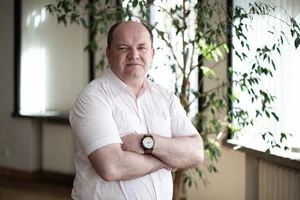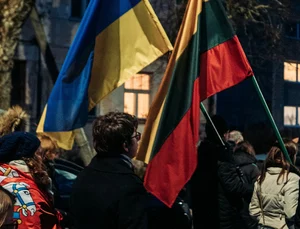A recent survey conducted by the KTU Faculty of Social Sciences, Arts and Humanities shows that more than half of Lithuanians (55%) are proud of democracy in Lithuania. However, there is much more scepticism about Lithuania’s resilience to threats.
According to the survey of the Lithuanian population, only just under a third (29.4%) of respondents agree with the statement that Lithuanian society is prepared to face the threats of war; 44.6% of respondents disagree with such a statement, and 26.6% have no opinion at all.
Confidence in democracy in Lithuania has doubled
Eglė Butkevičienė, Vaidas Morkevičius and Vytautas Valentinavičius, researchers at KTU’s Faculty of Social Sciences, Arts and Humanities, who study the resilience of society and the attitudes and behaviour of Lithuanian citizens towards science and citizenship, note that the percentage of those who are proud of Lithuania’s democratic performance has increased significantly in ten years.
According to Professor Butkevičienė, in 2013, there were significantly fewer people in Lithuania who were proud of the functioning of democracy – only 23.3 per cent of research subjects responded positively.
However, the survey also shows that the population is aware of the confrontation in Lithuania and is sceptical about our country’s readiness to withstand various crises. The latter findings were rather worrying for the researchers.
A divided society that trusts populists
Analysing the data from the survey, the KTU researchers note that 43% of respondents disagreed with the statement that our society is ready to withstand crises. Only 31.5% of respondents agreed with this statement, and the rest (24.5%) disagreed with both statements.
A large proportion of respondents (48%) also disagreed with the statement that Lithuanian society is ready to recover from crises, while only 30.2% of respondents agreed. More than half of survey takers also agree that Lithuanian society is divided (54%) and a whopping 70.2% of respondents agree that there is a conflict between ordinary people and the government.
Another important indicator in the run-up to this autumn’s Seimas (Lithuanian Parliament) elections is that 40.6% of respondents believe that the Lithuanian public believes populist statements made by politicians, while only a third of respondents (33.1%) disagree with such a statement.
Democracy means different things to different people
Questions on citizens’ participation and involvement in democratic processes revealed that more than a third of respondents would take part in protests (34.1%) or would not take part but would support them (39.7%) if politicians tried to restrict democracy in Lithuania. Similarly, less than a third of respondents would participate in protests (29.8%) if politicians tried to restrict media rights and freedom of expression, and 42.4% would not participate but would support them.
When asked to assess the democratic processes in their country, respondents agreed that it is crucial in a democracy that all citizens have a decent standard of living (87.4%), that the government respects and protects the rights of minorities (64.4%) and that there are more opportunities for public participation in public decision-making (72.3%).
Many ethnic groups surveyed
The representative survey, commissioned by the KTU Faculty of Social Sciences, Arts and Humanities, was conducted among Lithuanians (96.6%), Russians (2.2%), Poles (0.6%), Ukrainians (0.5%) and Belarusians (0.2%) living in big cities (39.2%), towns (29.5%) and rural areas (31.3%). 62.5% of respondents took part in the parliamentary elections in October 2020, and 37.5% of them did not take part in the elections.
The largest share of respondents (37.4%) indicated that they belonged to households with an after-tax income of between €1,200 and €2,500, 32.8% to households with an after-tax income of between €600 and €1,200 and 15.6% to households with an after-tax income of over €2,500. 14.2% of participating households had an after-tax income of less than €600.
The representative survey was conducted by Eurotela on behalf of the KTU using multi-stage probability sampling and geographical stratification by size of residence and administrative affiliation. The survey was conducted through face-to-face interviews with 1,252 respondents. The population survey was held between May and July 2024. The survey sample in Lithuania represents 2,794,207 inhabitants over the age of 18, of whom 1,886,148 live in urban areas and 908,059 in rural ones.
The KTU researchers’ investigation into the attitudes and behaviour of the Lithuanian population towards science and citizenship is part of the research project Strengthening Resilience of Society and Communities through Citizen Science and Citizenship (RECONECT) (Project No. S-VIS-23-14), funded by the Lithuanian Research Council under the competitive priority research programme “Strengthening Society’s Resilience and Management of Crises in the Context of Contemporary Geopolitical Developments”.





